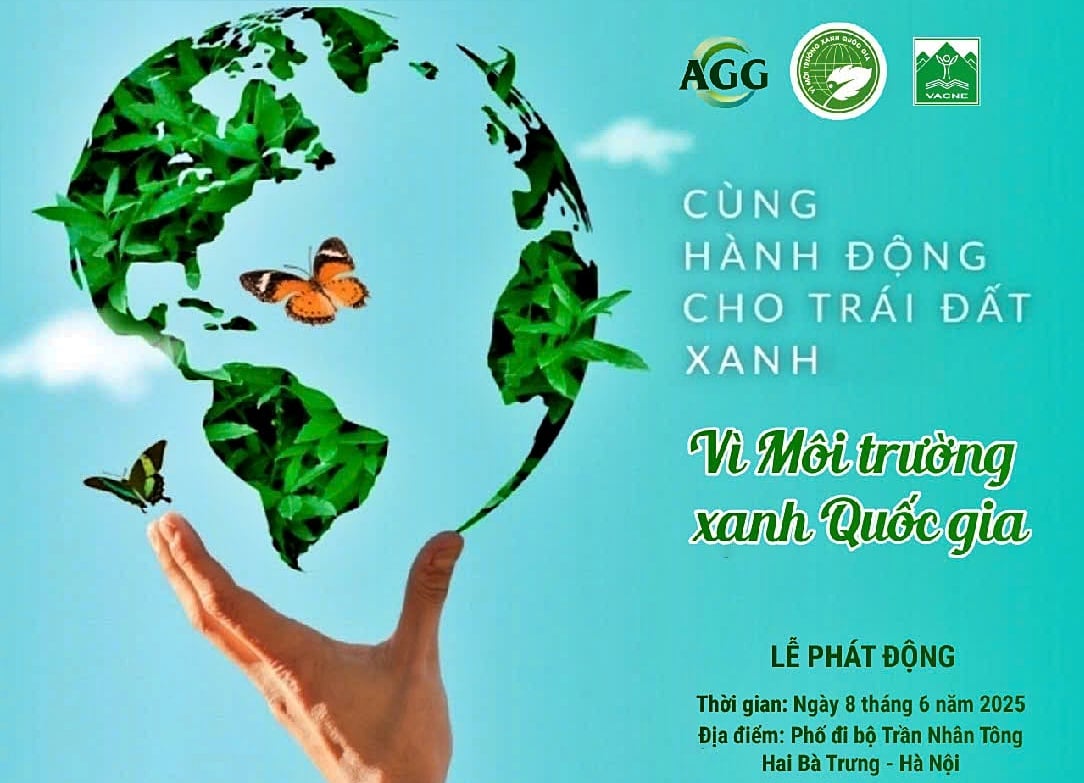December 30, 2025 | 21:02 GMT +7
December 30, 2025 | 21:02 GMT +7
Hotline: 0913.378.918
December 30, 2025 | 21:02 GMT +7
Hotline: 0913.378.918

The launching ceremony of the program "For a Green National Environment" is scheduled to be held on June 8, turn Net Zero commitments into concrete actions.
Vietnam launches national green environment program 2025 to advance Net Zero goals
In response to escalating climate change and environmental degradation, Vietnam has intensified its commitment to achieving Net Zero carbon emissions by 2050. A pivotal initiative in this endeavour is the "National Green Environment Programme 2025," recently launched to promote sustainable living and business practices aligned with Environmental, Social, and Governance (ESG) criteria.
The Vietnam Institute for Green Growth Research, under the Vietnam University of Agriculture, issued Plan No. 24/KH-AGG on 14 May 2025, outlining the implementation of the programme from 2025 to 2026 under the theme "Green Era – Era of Advancement." The program aims to inspire environmental action, foster sustainable development, and progressively realise Vietnam's international net-zero commitments.
Marking its 13th year, the program is a collaborative effort between the University and the Vietnam Association for Nature and Environment Protection, with support from the Ministry of Agriculture and Environment. This year's events are designed as green, resource-efficient, and low-emission models that can be replicated across localities.
The launch event, which is expected to attract around 1,000 participants, is scheduled for 8 June at Tran Nhan Tong pedestrian street in Hanoi. Activities will include exhibitions of green models and products, the "National Green Ambassador" competition, "Green Fashion" shows, the "Journey to Net Zero" conference, the "Zero Waste Living" campaign, and the release of the "National Green ESG Enterprises 2025" survey report.
Dr. Hoang Hiep, Director of the Vietnam Institute for Green Growth Research, highlighted the environmental pressures due to rapid urbanisation and economic growth. He noted that implementing net-zero strategies remains inconsistent and has yet to effect significant behavioural changes within communities. "We need to shift societal perceptions and boldly pilot low-emission models in urban areas," he stated.
Dr. Hiep emphasised the crucial role of private enterprises in realising net-zero objectives. Integrating ESG criteria into business operations not only enhances climate resilience but also boosts competitiveness. He proposed incentives such as green credit, green taxes, and technical support to promote implementation. "Even simple actions like using public transport or energy-efficient appliances can help individuals reduce emissions by 5–7%. This forms the foundation of the green lifestyle our programme advocates," he added.
A new feature of this year's program is the publication of the "National Green ESG Enterprises 2025" survey results, providing a comprehensive assessment of Vietnamese businesses' sustainability, social responsibility, and governance capabilities.
Dr. Tran Van Mieu, Vice President of the Vietnam Association for Nature and Environment Protection, underscored that this is the first nationwide evaluation based on ESG standards. The survey results will help identify pioneering enterprises, thereby promoting green development trends in the private sector.
All program activities are mandated to be economical, feasible, innovative, and have long-term impacts. Outcomes will be quantified using specific indicators to inform policy adjustments and refine Vietnam's green development model.
The program is set to run until December 2026, with peak phases each quarter. It aims to effect substantive changes in behaviour, policy, and Net Zero implementation capacities among stakeholders.
Enhancing the Programme with Additional Insights
To further contextualize Vietnam's efforts, it's noteworthy that the country has set ambitious targets in its National Climate Change Strategy. By 2050, Vietnam aims to cap total emissions at 185 million tonnes of CO₂ equivalent. The strategy also plans to compensate for remaining emissions through land use, land-use change, and forestry (LULUCF) sector removals and increased carbon sequestration in agriculture.
Moreover, Vietnam's commitment to ESG principles is reflected in the recognition of enterprises leading in sustainable practices. For instance, the Binh Son Refining and Petrochemical Joint Stock Company (BSR) was ranked among the Top 10 ESG Vietnam Green Enterprises 2025 in the energy and oil & gas sector. This acknowledgment highlights BSR's significant commitments and progress in implementing ESG goals and promoting sustainable development.
In the realm of green finance, Vietnam is making strides to support its net-zero ambitions. A technical meeting titled “Promoting green finance towards net zero emissions in Vietnam” was held in Hanoi on 25 March 2025. The meeting aimed to share the latest trends and updates on green finance within an international framework. It emphasised the crucial role of green finance in promoting low-carbon emission targets and supporting the transition of high-emission sectors toward net zero.
These initiatives, among others, underscore Vietnam's multifaceted approach to achieving its net-zero goals, integrating community engagement, corporate responsibility, and financial mechanisms to foster a sustainable future.
Translated by Huong Giang

(VAN) From extensive shrimp ponds, baskets of don gathered on the mudflats, to boats carrying visitors to watch birds, all livelihoods here depend on clean water, green forests, and the calls of migratory birds.
/2025/12/26/0703-3-204813_117.jpg)
(VAN) Transparency in information and listening to local people have helped address ground clearance bottlenecks and build social consensus, thereby accelerating the progress of the JICA3 irrigation project.
/2025/12/27/0609-3-233846_327.jpg)
(VAN) The JICA3 project is expected to become a 'water shield,' helping control saltwater intrusion, proactively secure water resources, protect livelihoods, and promote sustainable development in coastal areas.
/2025/12/26/5654-3-164509_655.jpg)
(VAN) As Viet Nam makes strong commitments toward achieving net-zero emissions, controlling and reducing methane emissions in livestock production is increasingly becoming a mandatory requirement.

(VAN) 'People, Primates, Plants: Co-managing Biodiversity and Improving Livelihoods in Vietnam' (the PPP Project) is an international initiative implemented in Vietnam by BGCI, CEGORN, and ICRAF/World Agroforestry.

(VAN) Dak Nong established a risk-level zoning map for coffee, built a digital data platform for the sector, and promoted certified production in line with EUDR.
/2025/12/25/2709-1-211551_295.jpg)
(VAN) In response to the U.S. Marine Mammal Protection Act (MMPA), Gia Lai province is implementing many solutions to protect marine mammals and develop sustainable, responsible fisheries.